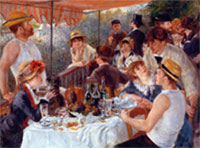|
|
Using Philosophy in
|
|
|
|||||||||
|
|
| |||||||
|
|||||||||||||||
| |||||||||||||||

Above:
Renoir Boat
Party.
Friendship and love are inseparable from happiness.
Commentary
Is happiness possible or lasting?
«Isn’t precisely happiness what
everybody wants?», asked Saint Augustine, in the 5th century.
«All human beings are equal in both their desire for happiness
and their right to obtain it», considered the Dalai Lama more
recently, embodying a largely consensual answer.
But is happiness possible or lasting? And under what conditions?
The answers are, naturally, many and very divergent. Goethe, as most of us, admits the existence of happiness though not lasting: many things do last, but not continuous happiness. This is a consensual perspective, as much as the Dalai Lama’s about our continuous and intimate search and desire for happiness. Pain and fears are always peeping into, always ready to break our lives, but happiness exists as well…
This is not the view of Pascal, a great Christian thinker of the seventeenth century. For him, human happiness was an impossible task. Listen to him: «Our minds do not require great education to understand that there is no real and lasting satisfaction; that our pleasures are only vanity; that our evils are infinite; and, lastly, that death, which threatens us every moment, must infallibly place us within a few years under the dreadful end of being for ever either annihilated or unhappy».
Despite his intense faith in God, and unlike St. Augustine, Pascal didn’t achieve inner peace, certainty or illumination. To Pascal, it was impossible to escape from the cruelty of the world, despite our attempts otherwise. «The king is surrounded by persons whose only thought is to divert the king, and to prevent his thinking. For he is unhappy, king though he be, if he think of himself», he considered, in a partially metaphorical tone.
Perhaps what Pascal lacked is «good health and bad memory » that Ingrid Bergman spoke of as being essential to happiness. Pascal suffered very much from illness, which may indeed have had some weight on his ideas about our existential situation.
What was also missing for Pascal was the conviction of St. Augustine, the militant and illuminating faith, for which the epoch may have counted – science, in the seventeenth century was drafting its first leaps and secular thought was beginning to replace Saint Augustine’s mystics... The human world was driving away from the Church and faith. Science was revealing a universe made of an infinite number of galaxies, incomprehensible to man, incompatible with traditional faith, which negatively impressed and anguished Pascal.
St. Augustine and Pascal both show how our happiness depends on our ideas and philosophies of life. The negative impact of Pascal’s existentialist ideas and conceptions on his happiness (or lack of it, to be more precise) is obvious. Also obvious is the great impact of Saint Augustine’s faith (though apparently very similar to Pascal’s) in the happiness he felt after his conversion to Christianity.
Also curious, is how these same ideas can vary, or be recovered, or be apostatized. «God, give me chastity and continence, but not just now!», demanded Saint Augustine, some years before his adoption of the Christian faith. «Far from me, far from the heart of your serf, my God, confessing to you, the idea of finding happiness in whatever the joy!» he wrote some years after, already converted to Christianity, refusing secular pleasures.
Eduardo Reisinho & MeaningsOfLife.com. All Rights Reserved.